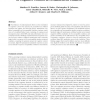Free Online Productivity Tools
i2Speak
i2Symbol
i2OCR
iTex2Img
iWeb2Print
iWeb2Shot
i2Type
iPdf2Split
iPdf2Merge
i2Bopomofo
i2Arabic
i2Style
i2Image
i2PDF
iLatex2Rtf
Sci2ools
JOCN
2011
2011
Cardiorespiratory Fitness and the Flexible Modulation of Cognitive Control in Preadolescent Children
■ The influence of cardiorespiratory fitness on the modulation of cognitive control was assessed in preadolescent children separated into higher- and lower-fit groups. Participants completed compatible and incompatible stimulus–response conditions of a modified flanker task, consisting of congruent and incongruent arrays, while ERPs and task performance were concurrently measured. Findings revealed decreased response accuracy for lower- relative to higher-fit participants with a selectively larger deficit in response to the incompatible stimulus–response condition, requiring the greatest amount of cognitive control. In contrast, higher-fit participants maintained response accuracy across stimulus–response compatibility conditions. Neuroelectric measures indicated that higher-fit, relative to lower-fit, participants exhibited global increases in P3 amplitude and shorter P3 latency, as well as greater modulation of P3 amplitude between the compatible and incompatible stimulus–...
| Added | 15 Sep 2011 |
| Updated | 15 Sep 2011 |
| Type | Journal |
| Year | 2011 |
| Where | JOCN |
| Authors | Matthew B. Pontifex, Lauren B. Raine, Christopher R. Johnson, Laura Chaddock, Michelle W. Voss, Neal J. Cohen, Arthur F. Kramer, Charles H. Hillman |
Comments (0)

